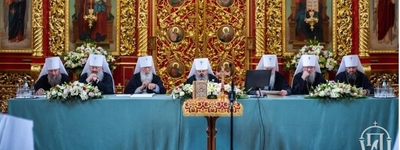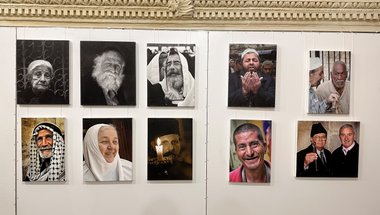"Victory" of Russian Orthodoxy or how Metropolitan Onufriy defeated Patriarch Kirill
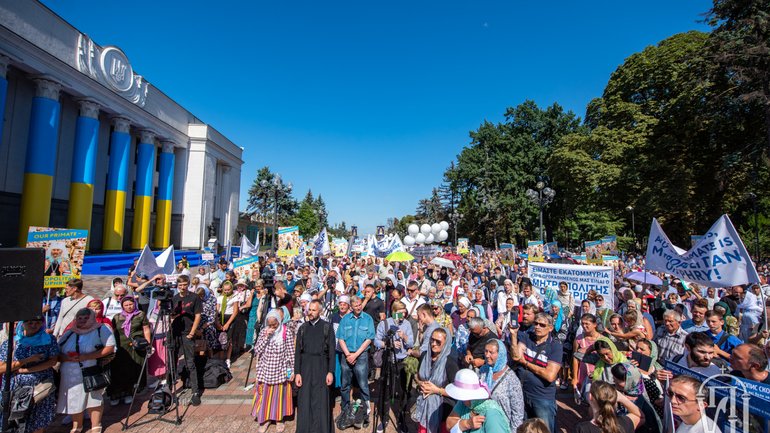
There is nothing surprising in the fact that this “victory” was noted by the TASS agency and the Russian Orthodox Church: the victories of Russian Orthodoxy here are no different from the victories of Russian arms, Russian spirit, or anything that may be Russian. Sometimes adjectives prove to be more important than nouns which nearly always involves the transformation of truth into post-truth.
It was more interesting to observe the alleged liberal wing of the ROC, which, as it turned out, also needs a victory. But the reasons, as well as the profile of this victory, look different.
Looking for an alternative
I have no illusions about Russian liberalism – I know where it usually ends. Of course, this is also true for the church milieu. The “One People” concept has an additional and often decisive bond — “One Church”. And it is not the Orthodox Church as a whole, but the Moscow Patriarchate in particular, which turns out to be a certain heavenly projection of the “Holy Rus” that once became a thing of the past and got extremely mythologized.
Many people on both sides of the Russian-Ukrainian border are still nostalgic for this myth and believe that if there was no “Holy Rus”, it would have been worth inventing. This confidence unites many alleged Russian liberals with conservatives. Liberals regret only that this beautiful myth was given to fools.
How could it be otherwise?
This is the question asked by those dissatisfied with the state of affairs in the ROC. Both Ukrainian Churches — the OCU and the UOC-MP are considered two different models of alternative history for the ROC. In a way, both try to answer the same question: what could the ROC have become if it were not for...
“One People”, as you can see, becomes an indispensable condition for this intellectual experiment: therein, Ukrainians are the same as Russians, only without Kirill and, possibly, Putin. Evil tongues add that without gas and oil too but that is a step too far. In addition, should the list be extended some more, the “one people” version may fall apart.
Thunder of Victory
While a year and a half ago the OCU was given particular attention as hopes for renewal for the entire post-Soviet Orthodoxy were pinned onto it, during the visit of Patriarch Bartholomew it became evident that sympathies were redistributed. The UOC-MP turned out to be the favorite of Russian observers again. Some of them did not even hide their mixed feelings – irritation, disappointment, jealousy, resentment – towards the OCU and the Ecumenical Patriarch. Others disregarded those all together – it was the “victory” of the UOC-MP as a whole and its Primate in person that fully captivated their attention.
The “great” procession of 350 thousand believers, the “fright” of the Ukrainian authorities and, of course, the gigantic figure of Metropolitan Onufriy, were equally (albeit with different accents) glorified by both “conformists” and “liberals” of the Russian Orthodox Church. While the OCU and the Patriarch were the subjects of derisive comments and unfavorable comparisons.
Despite the fact that 350 thousand is a largely exaggerated figure (to be fair, 55 thousand counted by the police is also quite decent, but Russian liberals are much more familiar with quoting official fakes than fact-checking). Allegedly, the Metropolia and its political partners finally fell into infighting, allegations were also made regarding for what and for whose sake the believers "took to the streets" (whose money sponsored turned out to be pretty obvious). Allegedly, the visit of Patriarch Bartholomew, against which the faithful protested by holding a religious procession, organizing rallies and pickets, took place in full and even with some splendor despite their fierce resistance.
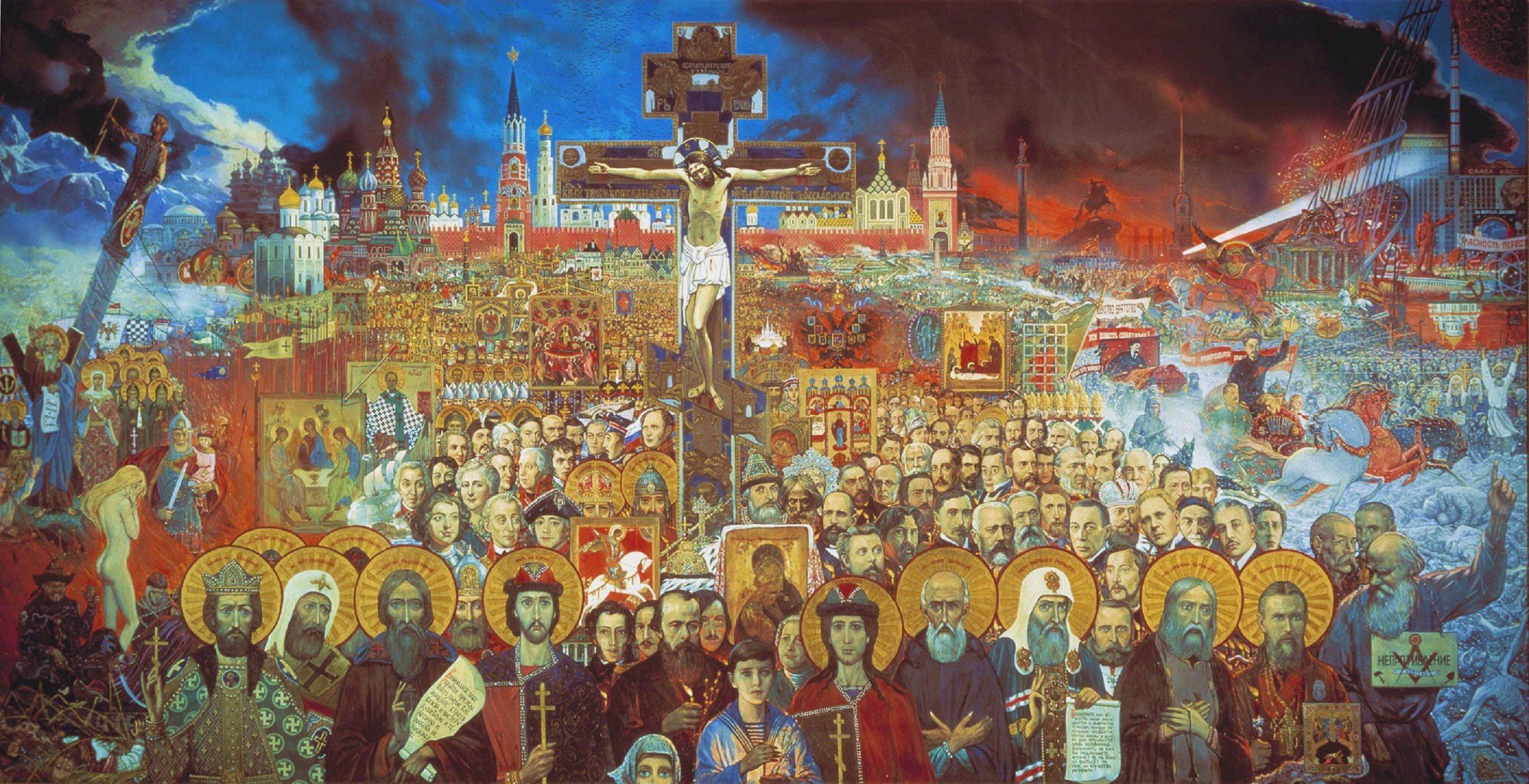
Not to mention that these actions debunk the myth of the “persecuted church” – the believers’ protests were not obstructed by the authorities in any way. They were given full freedom of assembly on the streets and squares of Kyiv. This might seem a “victory” from a Russian TV viewer’s perspective as only winners can march across Moscow. But in Kyiv, freedom of assembly is a default thing. As one Russian commentator sarcastically noted, “everyone is used to it.” Just like in Moscow, they are probably used to the idea that one will certainly be detained for an uncoordinated picket.
Why do we find such a passionate desire to see the “victory of the UOC-MP” where there is none?
Those dissatisfied with the situation in the ROC really need a positive example. Look, they say, this is possible, if only our people would behave differently.
This explains the growing support for the UOC MP – as a role model, of course, it outmatches the OCU. It is not so because the OCU allegedly “amalgamated with the authorities”, as Russian liberals and conformists are trying to convince each other. It’s just that the UOC-MP are “our guys”, while the OCU are mostly “strangers”. The UOC-MP is the very post-Soviet Russian Orthodoxy, without cultural and language barriers, as well as without Putin, Patriarch Kirill and the millions of ‘Legoydas’. It succeeded where its Mother Church failed.
One could answer that the ROC could not have done what the Ukrainian Church (any of them) can do. The UOC-MP (like any other Ukrainian Church) does not amalgamate with the authorities not because it opposes, resists and wins. But because they find it impractical and not very feasible in our conditions.
The main difference between us that makes such a fusion of power and the church elite impossible, as church diversity in Russia, which the neighboring country considers a threat to the national security (not groundlessly so). We have several Churches, each of them having a decisive weight in at least one region of the country and more or less stable alliances with regional elites, political forces and individual oligarchs. An example of such an alliance is the joint campaign for the Tomos by Petro Poroshenko and the OCU. Another example is the procession of the UOC-MP, funded by Vadym Novinsky and his associates from the Opposition Bloc ‘For Life’ party.
In other words, we have the church politics intertwined (but not merged) with politics per se – with all the intrigues, scandals, investigations, competition, calculations and miscalculations. It is interesting to watch our church situation – just like you watch the “House of Cards” TV series (or “Sex and the City” – whatever you prefer).
The Russian Church situation is different. The intrigue here is not who will end up with who in the next season, but how many steps up or down the head of the Church will take in the Kremlin hierarchy. Therefore, attention is focused not on the Patriarch, but the Master of the Kremlin (and this, of course, is offensive to the clergy), because this movement depends on him alone. Will Putin, for example, go to his home city St. Petersburg for the 800th anniversary of St Alexander Nevsky, the beloved saint of the Patriarch? Or will he go to Pskov for the monument unveiling? And what does his choice mean for the Patriarch and for the entire ROC?
I can understand the Russian Church liberals, who are annoyed with this complicated subordinate position of the Church and its head. They want to see that things can be different. But in such a way that this “different” does not force them to change.
Here the UOC-MP serves as a near-perfect example.
Who is the Patriarch to whom?
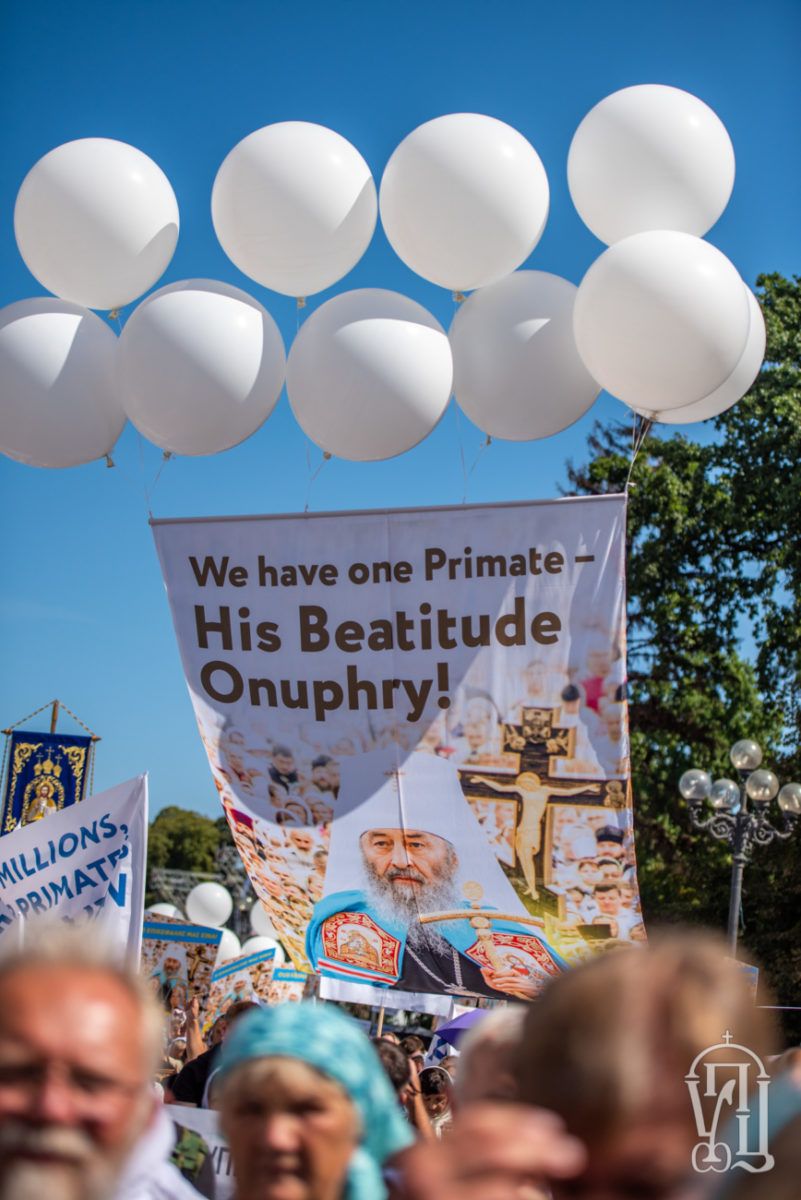
However, the UOC-MP is also forced to show flexibility, for these are the trends of the time. Of course, the visit of Patriarch Bartholomew is an outrage. Still, the protests and pickets never crossed the line: the rallies were curtailed two minutes before the man of the hour appeared (a coincidence, of course), the pickets arrived at the wrong addresses (by mistake - nobody’s perfect). And the parade: Metropolitan Onufriy shouldn't miss the official celebrations just because the “untouchable” Patriarch is attending too!
I do not claim there was a direct agreement between Metropolia and Bankova street. But the Metropolia demonstrated extraordinary finesse, on the one hand, having shown themselves in public, and on the other, not spoiling either the festival for people or the selfies of President, the Speaker and the Prime Minister with the Patriarch.
Something is happening behind the ancient walls of the Kyiv-Pechersk Lavra. Those who could not turn their tongue to pronounce the words “Ukrainian nation” until recently, whose legs did not straighten up to honor the fallen soldiers of the Eastern front, now welcome independence and emphasize their own role in its establishment. An exhibition under this title, dedicated to Independence Day, was held in the Kyiv-Pechersk Lavra.
More conspicuous, however, were the billboards on the streets of Kyiv featuring Metropolitan Onufriy, who congratulated Ukrainians on the country’s birthday while sporting a radiant smile.
Such an unexpected pro-Ukrainian zeal of the UOC-MP leaders sets off (not to say contradicts) the stance of the Moscow authorities, who did not congratulate either Ukraine or Moldova on their Independence Day. Nevertheless, they congratulated Kyrgyzstan, which brings us to the conclusion that “no congratulations” is certainly not a principled position of the Moscow Patriarchy. They do not waste their greetings on just anyone. We did not deserve it.
But Metropolitan Onufriy managed to turn even this fact to his benefit. The Patriarch acts as he pleases — he does not convey greetings and generally looks like a surly person — but the head of the UOC MP offers his congratulations, guarantees full cooperation and radiates benevolence. There is no doubt that the UOC-MP, first of all, is the Ukrainian Church, and not some “ROC in Ukraine”, as the detractors claim. Secondly, as you can see, it enjoys complete independence from Moscow politics.
It can be assumed that the UOC-MP leader has learned some lessons from the recent trials and losses, and decided to retreat and regroup.
A Counter-Patriarch
Metropolitan Onufriy of Kyiv has always been respected by the Russian Orthodox Church. But lately, he has become a true star. More and more often, he is being compared with Patriarch Kirill, and not in favor of the latter.
Of course, the figure of Patriarch Kirill is depressing – in a permanent quarantine lockdown and, obviously, for a sole purpose – to be admitted to the “one of the highest station”. Moreover, this “one” is in no hurry to show favor in turn, which makes it especially distressing to watch.
Against this background, the Metropolitan Onufriy's posture looks almost titanic. He is equally indifferent to the Ukrainian government with its political climate and is free from the Moscow political agenda. He goes out to the crowd with a blessing, and at the same time, he manages to keep it from outrages. His hands are clear of “breguet”, and his conscience is clear of political compromises.
It is not surprising that the figure of Metropolitan Onufriy is gradually becoming a cult figure in the Russian Orthodox Church – he is almost the direct opposite of Patriarch Kirill, who is blamed for all the church issues by both conservatives and liberals.
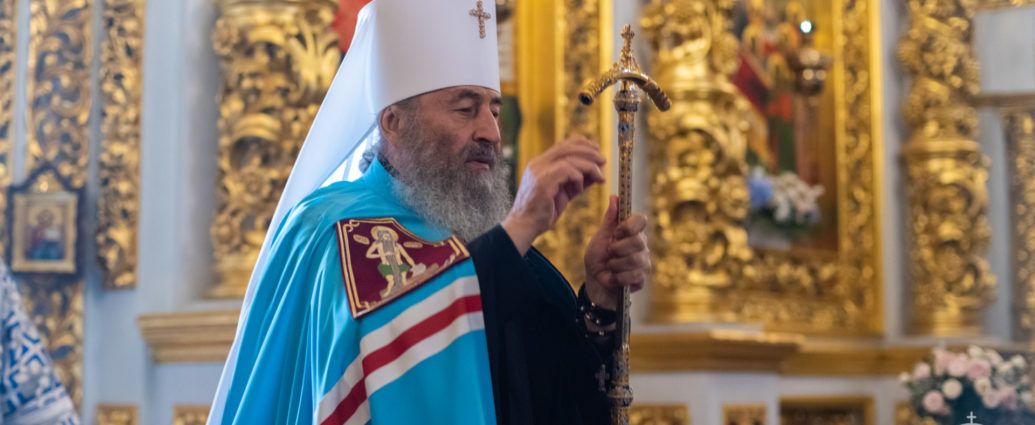
But Metropolitan Onufriy is popular with both conservatives and liberals. Some people admire him as a pillar of Russian Orthodoxy, an ascetic, an ideal monk and, generally speaking, one of the gang. Others like his sovereignty: he is independent of either Bankova street or the Moscow Patriarchy, he follows his path and nothing can make him digress. Of course, he does not reject Novinsky’s sponsorship. But these are mere trifles. He is not dependent on this sponsorship. And this, by the way, is an issue for Novinsky – it would be more convenient for him to work with someone more mundane and, accordingly, manageable.
If the question of the next Patriarch was to be raised in the foreseeable future, I would not be surprised to see Metropolitan Onufriy among the candidates. While Patriarch Kirill and Metropolitan Tikhon Shevkunov are rivalling for Putin's favor, another competitor is rising and gaining weight in a silent cell in the near abroad. In the context of Moscow church policy, this would be a strong move. The only disadvantage of Metropolitan Onufriy is that he is Ukrainian. The dominance of Ukrainians in the ROC irritates a lot of people.
But this is also an advantage. First, the Ukrainian head of the Russian Church is an excellent bond. Secondly, Metropolitan Onufriy, although a Ukrainian, has no sympathy for the Ukrainian idea. On the contrary. No matter how nicely he smiles from the billboards, for many reasons – both personal and ecclesiastical ones – he distances himself from the idea of Ukrainian sovereignty as much as possible. I will not analyze these reasons for they are irrelevant here. I will only say the key thing: Metropolitan Onufriy’s anti-Ukrainian sentiment is not a consequence of “Moscow’s pressure”, as commonly believed. This is not a political position, which can manifest itself in sabotage in favor of a hostile state, in the state treason and other terrible things. This is a purely monastic aloofness, in which neither Ukraine nor Russia exists, but everything is united in Holy Russia.
There are contexts in which the word “reality” is inappropriate and sounds absurd. This is what captivates many people. Especially in Russia, in the Russian Orthodox Church, where hopes for a “patriarch-manager” have long been ousted with disappointment, and the image of a “patriarch as a man of prayer” seems quite a natural alternative.
You can see for yourself how well the UOC-MP is doing...
A better version of the ROC
Nevertheless, with regard to the OCU, most Russian observers (with some exceptions) are disappointed. And it concerns not only the OCU but the entire Ukrainian project. The explanation is quite simple – we are not what they would like us to be. In a search of a church emancipation model, the majority switched from the OCU to the UOC-MP – not because they are better at it, but because they are closer and clearer.
Our national – including the church-related – searches, goals and ways of achieving them are increasingly alien to the Russian spirit. And the postcolonial syndrome – resentment, unpaid bills, unclear relationships, refusal to admit crimes (I do not mean repenting) – aggravates the situation.
It is much easier for one’s own conscience to dismiss it and call it all a “failed church” (by analogy with a “failed state”) than to accept the need to change something in themselves in order to understand or simply accept the others as equals.
In the perspective of a Russian observer, Ukraine and its Church have gone inconceivably too far, choosing other allies, independently interpreting the past and modelling the future. This evokes ambivalent feelings among Russian liberals. On the one hand, they agree it is impossible to deal with the current Moscow Patriarchate and the Kremlin. But “dashing over to the Greeks” is still a betrayal. Just as the national idea and the rejection of the “Russian brotherhood” turns out to be a “betrayal”.
Now the UOC-MP performs another therapeutic function. For a Russian observer, it embodies that very “Ukraine” that remains “ours”. One can still consider it as the real and the true one. And the one who moves away makes a mistake (or gets involved in betrayal, depending on the degree of emotional pathos).
In the perspective of even the most sympathetic Russian observer, the problem with the OCU – as well as with the entire Ukrainian project – is not that we are imperfect, that we get everything either confused, or slow, or just scary, or that we did not turn from a post-Soviet ruin into a prosperous European state overnight.
The problem is that we have not turned into the better version of Russia and the ROC. And we don’t even try.
Had the OCU turned into the ROC 2.0 of sorts, the UOC-MP would have had no chance of success. But it didn’t. It still has a lot of weaknesses peculiar to a post-Soviet church (well, she didn’t appear out of thin air!). On the other hand, it has features that are uncharacteristic, inconceivable and, perhaps, even unpleasant for Russian Orthodoxy. Therefore, all that a supposed Russian church liberal has to do is to consider the UOC-MP an “improved version of the ROC” and to give a standing ovation to Metropolitan Onufriy.







